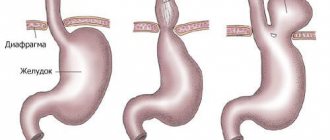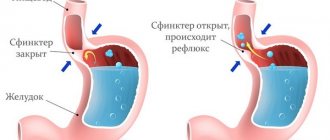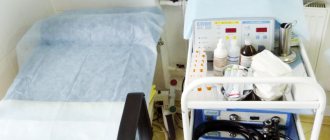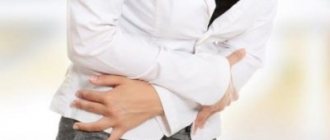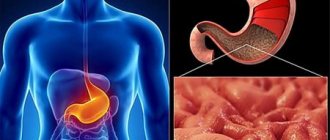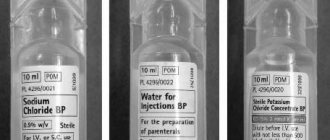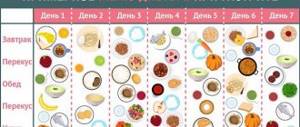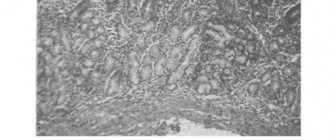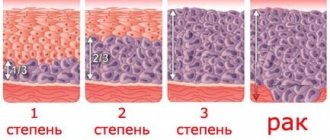- September 23, 2018
- Gastroenterology
- Evdokimova Irina
The human digestive system is a complex multifunctional device. The work of all organs of the gastrointestinal tract is harmonious and interconnected. Disruption of the functioning of one of the sections of digestion causes disruptions in the entire system. Many gastric diseases are not associated with either infection or tumor; these pathologies are caused exclusively by functional abnormalities. One of these ailments is cardia insufficiency; what it is will be discussed further.
Severity of defeat
The extent of damage to the lower esophageal sphincter can only be accurately determined by endoscopic examination - fibrogastroscopy. Despite the unpleasantness of the procedure, when making a diagnosis it will provide maximum information to both the doctor and the patient.
Based on visual signs, three degrees of damage to the cardia are distinguished.
- First degree failure. The cardia is mobile, but does not close completely. The unclosed space is up to 1/3 of the sphincter diameter. In patients, as a rule, it manifests itself with frequent air belches.
- Insufficiency of the second degree. The sphincter closes to half its diameter. In some cases, protrusion of the gastric mucosa into the esophageal cavity occurs. Patients, in this case, complain of frequent and painful belching.
- The most severe cardia insufficiency is the third degree. There is no valve closure at all. An endoscopist may detect signs of esophagitis.
Stages of the disease
There are several degrees of gastric cardia insufficiency. What it is? Depending on how much the sphincter loses its ability to close, there are 3 stages of the disease:
- Stage 1. Incomplete closure of the cardia rosette occurs. Patients complain of frequent belching. During endoscopic examination, a small gap (about 1/3 of the diameter) can be seen in the cardia when the patient breathes deeply.
- Stage 2. With deep breathing, the gap increases to 1/2 the diameter. The patient complains of nausea and a feeling of heaviness in the digestive organs.
- Stage 3. The sphincter completely stops closing. If the patient suffers from liver pathologies, this aggravates the development of cardia failure. Symptoms of esophagitis (inflammation of the esophagus) become pronounced.
In the photo you can see endoscopic changes in the cardia with insufficiency: gaping gaps and inflamed areas.
Causes
Insufficiency of the cardiac sphincter can be caused by such reasons.
- Organic factors, i.e. reasons not related to anatomical defects of the body. These may be complications after surgery.
- Functional reasons. Non-closure of the cardiac valve is most often a consequence of poor nutrition.
Let us consider in more detail the possible risk factors for the development of such a disease.
The very first and main risk factor is overeating or poor nutrition. Abuse of fatty foods, as well as chocolate, coffee and alcohol with a cigarette, leads to insufficiency of the gastric cardia. The high pressure inside it physically pushes the contents through the valve into the esophagus. This phenomenon is popularly called belching (with air or with the taste of food), and doctors call it esophageal reflux. If overeating is regular, then reflux of food from the stomach is regular. Inflammation occurs on the mucous membrane of the esophagus, ulcers and, over time, the tissues become so damaged that the sphincter no longer closes completely.
The next most common risk factor is excessive physical activity. Incorrect lifting of heavy things (“on your stomach”), attempts to lift a load that exceeds your own weight (women really like to move furniture, and men think that they can lift any weight), as well as sudden “jerks” with a load can cause a hiatal hernia.
Increased pressure on the cardia can be caused by other conditions not related to the stomach. For example, ascites or pregnancy increase intra-abdominal pressure, thereby putting pressure on the stomach and causing the reflux of food. Tumors of internal organs affect the stomach in a similar way, causing an increase in intra-abdominal pressure, as well as excess weight.
Factors influencing the development of the disease
Currently, many factors have been found that are directly or indirectly related to the development of such a disease as gastric cardia insufficiency:
- overweight and obesity;
- chronic diseases of the gastrointestinal tract, such as gastritis, ulcers, benign and malignant tumors, hypertonicity of the gastric muscle tissue;
- grasping hernia;
- increased intra-abdominal pressure, which can be caused by excessive physical activity;
- postoperative period after surgical removal of the cardiac sphincter;
- pregnancy leads to increased stress on the abdominal cavity and increased pressure;
- pyloric spasms;
- poor diet, overeating and the habit of frequently snacking, including before bedtime;
- an inactive lifestyle and sedentary work can lead to weakening of muscles and, as a result, to disruption of the functioning of the gastric cardia.
All these factors can cause the sphincter valves to not close completely.
Symptoms
The main symptoms of this pathology, as a rule, are the same for all patients: frequent belching, especially while lying down, heartburn, aching or burning pain, a feeling of a “full stomach,” obsessive nausea or spontaneous vomiting. Gurgling or “seething” may also occur. In some cases, general weakness, fatigue, apathy and depression are observed. If you discover similar symptoms in yourself, hurry up and see a general practitioner or gastroenterologist, since insufficiency of the gastric cardia must be treated promptly and fully. Otherwise, you risk complications such as peptic ulcers, bleeding and strictures (scars that reduce the lumen and reduce elasticity) in the esophagus. As well as long courses of treatment with regular unpleasant examinations.
Treatment
Treatment of the diagnosis of “gastric cardia insufficiency” involves the following methods.
- Diet and nutrition regimen. Meals should be divided into 4-5 meals of equal size. Overeating is strictly prohibited. The criterion of satiety is a slight feeling that a person has not eaten enough. The last meal (dinner) should be taken 2 or more hours before bedtime (no later). Products must be strictly dietary (boiled, steamed, lightly salted). Also, with the help of products you can reduce stomach acidity and the irritation it causes. To do this, the diet includes jelly or starchy mucus, enveloping (“snotty”) porridges. The following are excluded from the diet: fried, pickled, salty foods, any canned food, alcohol, chocolate and citrus fruits. It is recommended to stop smoking, but, alas, patients rarely heed this recommendation. In this situation, smoking, in addition to its main harm - nicotine poisoning, is also a powerful stimulator of the production of digestive enzymes. Those. when the patient smokes, his body thinks that he has eaten and begins to digest itself.
- Physical exercise. During the treatment period, all physical and emotional stress and, especially, overload are excluded. Instead, a physiotherapist can select a treatment that, in a gentle manner, will help restore the necessary tone of the cardiac sphincter, as well as the muscles on which the condition of the stomach in one way or another depends (abs, diaphragm, oblique abdominal muscles, lumbar and other muscles). Sometimes breathing exercises and some yoga practices are also added to regular exercises, mainly aimed at strengthening the diaphragm. But you cannot use this or that practice on your own only with the approval of a doctor and in close combination with other therapy.
- Drug treatment has several directions. Antacids (ranitidine, almagel, etc.) relieve symptoms of heartburn and burning pain. Therapy with such drugs protects the mucous membrane of the stomach and esophagus from damage by acid. In combination with them, agents for restoring the mucous membrane (omeprazole) are prescribed. Drugs to improve motility help overcome slight sphincter non-closure, as well as prevent congestion in the stomach. Antiemetic and painkillers are prescribed only by a doctor, since vomiting in this case is controlled at the level of a brain reflex, and the pain is so specific (it is caused by deep damage to the mucous membrane down to the muscle layer) that conventional analgesics cannot always cope. In some cases, antibiotics or antiprotozoal agents are also included in the treatment of cardia failure. This may be due to the Helicobacter bacterium, which causes gastritis, as well as infection of ulcers or other similar complications.
- Treatment with traditional methods has also proven successful. For example, inflammation of mucous tissues is successfully relieved by a decoction of dill, fennel or anise seeds. Heartburn is perfectly relieved by potato juice, sweet water prepared at night and drunk in the morning, chewing dry raspberry leaves, raspberry, chamomile or mint tea, fresh cabbage or juice from it, a solution of crushed activated carbon. Also effective are collections and decoctions of chamomile, flax seeds, motherwort and lemon balm herbs, licorice roots, plantain leaves, shepherd's purse herb, oregano, yarrow, fireweed, calendula, calamus rhizomes and anise fruits. The doctor should select herbs for collections and the concentration of decoctions, as well as their dosage, taking into account the individual characteristics of your body and the degree of damage to the tissues of the esophageal mucosa and the sphincter itself.
- Regular drinking water has a great therapeutic effect. It is recommended to drink half a glass of water before each meal (about 10 minutes before). This is due to the fact that with a lack of fluid, the gastric contents become viscous and incapable of normal digestion. Doctors also advise drinking water at night, especially if the symptoms the patient is experiencing include dry mouth, since it flushes the esophagus, does not allow food debris to linger in it, and thus makes an important contribution to complex treatment.
- Treatment of cardia insufficiency may also include a sanatorium-resort set of procedures. Specialists at the sanatorium will select effective physical and herbal therapy, prescribe an appropriate diet, and the resort environment will allow you to escape from the hospital regime and restore the patient’s psychological balance.
What is cardia
The human body consists not only of organs, but also of many sphincters. They ensure the transfer of contents from organ to organ. The role of the sphincter is played by the orbicularis muscle, the contraction of which causes narrowing and closure. In combination with vascular formations and folds of the mucous membrane, this muscle forms the sphincter apparatus.
The cardia of the stomach is one of the sphincters. It functions as an inlet valve into the gastric section from the esophagus. If everything is functioning correctly, the cardiac sphincter remains closed when the person is not consuming food. During eating, the cardia opens, so food can pass into the stomach. In addition, the cardia blocks the return of food masses. This process is normal.
What is gastric cardia insufficiency? When the sphincter stops closing, the cardia is unable to prevent the internal contents, which provokes reflux. In simple words, there is a reflux of food, hydrochloric acid and gastric juice into the esophagus from the stomach. This condition of the cardia is called chalazia. If symptoms of this disease are detected, it is recommended not to delay treatment. Useful articles on the topic - what is gastric metaplasia and how is it treated.
Etiology
Cardiac failure is a polyetiological disease. There are many provoking factors that can cause this state of cardia. In some cases, valve failure occurs due to a complex of reasons.
The most common causes of pathology:
- the presence of spasms in the pylorus;
- unhealthy diet, overeating;
- adynamia, swelling or high intra-abdominal pressure;
- overweight;
- hiatal hernia, chronic gastrointestinal diseases;
- eating too much before bed;
- operations associated with resection of the cardia.
Pathology can manifest itself even in those people who do not have stomach problems. The risk group includes people over thirty-five years of age. With age, the disease manifests itself more intensely. This is explained by atrophy of the abdominal muscles and low motor activity.
According to medical data, stomach problems are less likely to occur in people with developed muscles and a toned stomach. Malfunction of the sphincter can occur during pregnancy, which is explained by the location of the internal organs. Useful articles on the topic - the etiology of gastric reflux.
Degrees of deficiency
Pathology has several degrees of severity, which must be taken into account when prescribing therapeutic therapy. In many cases, the disease freezes at the first stage and does not progress. The symptoms bother you from time to time, without causing much discomfort. The severity of the disease can be determined using an endoscope, which can show whether the thickness of the cardia is increased and whether there are other lesions and complications.
- Degree 1. Incomplete compression of the sphincter occurs, the valve does not close 1/3. The clinical picture does not have any clear manifestations, so many do not pay attention to mild pathology, as well as frequent belching of air.
- Degree 2. Symptoms are much more pronounced than in the first case; incomplete closure occurs. The size of the unclosed opening is more than ½ the diameter of the esophagus. There is an increase in intra-abdominal pressure, an increase in the number of belches, and there is prolapse of the gastric mucosa.
- Degree 3. Non-closure is one hundred percent, but peristalsis of the esophagus remains, inflammation of its mucous membrane is observed.
To strengthen the cardia, there are special exercises, the implementation of which provides excellent results.
Diagnosis and treatment
X-rays will help make an accurate diagnosis of cardia insufficiency. Thanks to esophagoscopy, the picture of changes in the mucosa becomes clearer, and the pathology of the closure of the cardia can also be noticed. Reflux is determined using pH-metry, and a methylene blue test will help to detect its manifestation.
To eliminate unpleasant symptoms, the attending physician prescribes appropriate medications, namely a regulator of the motor activity of this sphincter. Such remedies train the valve and strengthen its muscles. The drugs contain Domperidone, Metoclopramide. They increase the muscle tone of the esophageal ring, which eliminates the problem of food reflux into the esophagus. If the cause of the pathology is a hernia, then surgical intervention - suturing - will be required.
If deficiency has developed due to gastritis, then you need to adjust your diet. A diet for gastric cardia insufficiency involves split meals. In the morning on an empty stomach you need to drink 250 milliliters of warm water and do physical exercises. It is recommended to remove junk food from the diet, exclude coffee, strong tea, alcohol, citrus fruits, fatty and spicy foods.
There are many effective drugs that help get rid of this disease. You can save yourself from heartburn with the help of medications such as Smecta, Almagel. You can also take parkinetics: Reglan, Metamol, Ceruglan, Perinorm, Metoclopramide. These products perfectly increase the tone of the cardia and prevent reflux.
Many people prefer to treat with folk remedies - herbs, decoctions, juices and infusions. Traditional recipes for strengthening the gastric cardia muscle:
- Before meals, drink 1 tbsp. a spoonful of plantain juice. For the winter period it is prepared as follows: combine 4 parts juice and 1 part alcohol, leave;
- Brew calamus (root) with 250 ml of boiling water. Take the resulting decoction 100 milliliters 30 minutes before meals;
- Place dandelion flowers in a three-liter bottle, alternating them with sugar. Grind to form a syrup. Dosage: dissolve 1 teaspoon of syrup in 100 ml of water, drink before meals;
- You can make an infusion based on caraway seeds. Brew 1 teaspoon of cumin in 200 ml of boiling water. Perfectly fights spasms, restores the functioning of the gastrointestinal tract.
To train the muscles of this sphincter, you can perform special breathing exercises. Gymnastics according to Strelnikova is considered effective. As a treatment, it is performed twice a day, in the morning and in the evening, 1500 movements before meals and after 1.5 hours. If gymnastics has a preventive value, it is done once a day: in the morning or in the evening.
Strelnikova’s breathing exercises train all parts of the body, including the cardia of the stomach. The effectiveness is explained by the rush of blood to all organs. In simple words, you are doing an internal “massage”.
Cardia insufficiency requires proper treatment and prevention, but first you need to find out the cause of the pathology. Therapeutic therapy consists of taking medications, folk remedies, breathing exercises and diet therapy.
Gastric cardia insufficiency is a disease in which incomplete closure of the valve separating the esophagus from the body of the stomach occurs. The function of the cardia is to protect the esophagus from stomach acid entering it. Why does this disease develop, what are its symptoms, how to treat it and can it be prevented?
Gastric cardia insufficiency - what is it and when is surgery needed?
Gastric cardia insufficiency, what is it? This is the name given to a pathological process in which the valve located between the stomach and esophagus does not close enough.
Another name for the pathology is chalazia. The danger of the process lies in the possibility of burns and ulcers on the mucous membrane.
In the most difficult cases, deficiency can lead to the degeneration of epithelial cells into malignant ones.
Cardia insufficiency - causes
There are many sphincters in the human body. They are needed to ensure that the contents of organs move safely between them.
Sphincters are essentially circular muscles that contract and close during contraction. Gastric cardia is one of these.
If the muscle works as it should, the sphincter remains closed when a person is not eating and opens when eating. In addition, the cardia prevents the reflux of food.
Gastric cardia insufficiency, what is it? This phenomenon is observed when the sphincter does not close, and food masses can move freely between organs. The main reasons why cardia rosette insufficiency may develop are as follows:
- eating disorder;
- constant overeating;
- overweight;
- eating right before bed;
- chronic stomach diseases;
- formations (benign and malignant);
- maintaining a predominantly sedentary lifestyle;
- hypertonicity of the gastric muscles;
- hernias;
- a sharp increase in pressure inside the abdominal cavity;
- excessive physical activity;
- pyloric spasms;
- unsuccessful surgery for resection of the cardiac sphincter.
The pathology can also be diagnosed in those who are not familiar with stomach problems. People over 35 years of age are at risk. With age, the symptoms of the disease become more intense.
This is explained by a decrease in motor activity of the abdominal muscles and their gradual atrophy.
Fit people with developed muscles learn about gastric cardia insufficiency and what it is much less often.
Cardia failure - symptoms
The severity of the symptoms of the problem depends on the degree of cardiac insufficiency. Common, most common symptoms of sphincter dysfunction include the following:
- pain and burning sensation in the stomach;
- heartburn, the occurrence of which is completely independent of meals;
- nausea;
- vomit;
- bloating and gurgling in the stomach;
- belching air;
- general weakness;
- dizziness;
- frequent headaches;
- chronic cough, against which asthmatic bronchitis sometimes develops.
Cardiac insufficiency of the 1st degree - what is it?
At the first stage, it is still difficult to understand the insufficiency of the gastric cardia muscle, what it is. The sphincter continues to contract, but does not do so completely, but only by a third. There are no pathological changes in the esophageal tube yet. Signs of cardia insufficiency are not so obvious. The most important symptom at this stage is frequent belching of air.
Cardiac insufficiency 2nd degree - what is it?
At the second stage, the deficiency becomes more pronounced. The muscle contracts only half the diameter of the esophagus. Through the resulting gap, sometimes even folds of the organ can fall out into the stomach. When the cardiac sphincter does not close completely, patients begin to complain of frequent attacks of heartburn, and belching occurs not only with air, but also with particles of stomach contents.
Cardiac insufficiency of the 3rd degree - what is it?
At the last stage, the sphincter ceases to function completely. At this stage, the most severe cardia failure develops - reflux esophagitis. There is widespread inflammation of the esophageal mucosa.
Heartburn becomes stronger, acute pain appears in the stomach, and eating becomes painful. Many people complain of nausea, vomiting and constant belching with the smell and taste of recently eaten foods.
Sometimes the temperature rises slightly.
Experts shout that preventing the disease is much easier than then thinking about how to treat insufficiency of the gastric cardia. Preventive measures are elementary - you only need:
- Eat little and often, without overeating.
- Wear loose clothes that do not restrict movement.
- Regularly perform exercises that put stress on the abdominal muscles.
- Try to lead an active lifestyle (at least regularly walk outside).
- After eating, go to bed no earlier than 1-1.5 hours later.
- Monitor your weight and try to quickly fight extra pounds.
- If you have heartburn, do not drink coffee, alcohol, or eat spicy, fatty, chocolate, or citrus fruits.
- Treat heartburn with acid-reducing medications.
Is it possible to cure insufficiency of the gastric cardia?
A popular question among all patients with a similar diagnosis. The answer is not very reassuring.
No, even stage 1 cardiac insufficiency cannot be cured, but with the help of special therapy, the manifestations of all symptoms can be minimized. Treatment must be comprehensive.
Otherwise, you will have to wait a very long time for the result. Therapy involves the use of conservative methods. It is customary to contact surgeons in the most complex and advanced cases.
Exercises for cardiac insufficiency
Light but regular physical activity will help:
- strengthen the esophageal sphincter;
- stimulate metabolic processes;
- increase immunity;
- reduce the rate of reflux of gastric masses into the esophagus.
Cardia insufficiency can be treated with abdominal massage. It's easy to do - with a hockey or tennis ball. Massage of the lumbosacral area also helps a lot.
During the diagnosis, it is useful to walk a lot, swim, ride a bike (only the torso should be positioned vertically).
If the sphincter is weakened, you can also take part in non-traumatic games, but it is advisable not to tilt your body forward.
Breathing therapy is getting good reviews. Its big advantage is that it involves not only the lungs, but also tissues and organs located nearby. You need to do the exercises on an empty stomach, otherwise the exercises will only harm the cardia and aggravate its condition. In this case, it is very important to use the abdominal muscles, because otherwise it will not be possible to increase the tone of the gastric sphincter.
Cardia insufficiency - treatment with folk remedies
Alternative medicine also knows the secrets of how to cure cardiac sphincter. A cool folk remedy is plantain juice. It is extracted from fresh leaves and drunk every day in the morning before meals, a tablespoon. So that the medicine can be taken in winter, it is preserved. The best recipe is to use 1 part alcohol for 4 parts juice. In this form, the product will be stored for a long time.
Diet for cardia deficiency
An important component of treatment is maintaining proper nutrition. In order for the functional failure of the cardia to stop developing, you will have to give up:
- spices;
- spices;
- fried;
- fat;
- canned food;
- smoked products;
- sour berries and fruits;
- pickles and marinated dishes;
- ketchup;
- muffins;
- fresh bread;
- stewed meat and fish;
- kvass;
- Luke;
- radishes;
- radish;
- legumes;
- pasta;
- rice;
- mayonnaise;
- hard-to-digest porridges;
- chocolate;
- alcohol;
- sour juices.
The list of permitted products looks like this:
- low-fat soups;
- beef;
- chicken;
- turkey;
- meat and poultry dishes, steamed or oven-cooked;
- crackers;
- wheat bread;
- dishes from lean fish;
- cereals with low fiber content;
- low fiber vegetables;
- omelette;
- puree;
- compotes;
- fruit jelly;
- jelly;
- weak tea;
- honey;
- sugar in small quantities.
Cardiac failure - surgery
Surgery is not the most popular treatment option for patients who have been diagnosed with cardiac insufficiency. Surgery is usually prescribed for organic causes of the disease, such as a diaphragmatic hernia, for example. In addition, those who do not respond at all to conservative treatment methods may be referred to surgery.
| Vibration disease - who is at risk of the disease, and how to cope with it? Vibration disease is an occupational disease that is often diagnosed in workers in the construction industry, agriculture, and transport services. Let's figure out what this disease is, how to recognize it and cure it. | Typhus – how to identify and effectively treat a dangerous disease? Typhus is diagnosed less and less frequently, but it remains a very dangerous disease with serious consequences, including death. Complications can only be prevented by effective and timely treatment and prevention of relapses. |
| Tissue necrosis can even lead to death; it is very important to know what it is and how it manifests itself. Timely detection of symptoms of cell necrosis is the key to successful treatment of pathology at an early stage, when the process of cell death is reversible. | Cellulitis - what is it, why does it occur, how to identify and treat it? Cellulitis is a very dangerous condition; it is important to know thoroughly what it is and what symptoms it is accompanied by. In the early stages of inflammation, it can be controlled with drug therapy without surgical intervention. |
Source: https://womanadvice.ru/nedostatochnost-kardii-zheludka-chto-eto-takoe-i-kogda-nuzhna-operaciya
Causes of cardia failure
The reasons for the development of this disease lie in the following:
- poor diet, in particular overeating;
- excess weight;
- gastritis and peptic ulcers of the stomach and duodenum;
- eating at the wrong time, particularly before bed;
- insufficient physical activity;
- pyloric spasms;
- increased abdominal pressure associated with pregnancy or ascites;
- increased intragastric pressure;
- sphincter resection operations;
- hard physical labor.
As already noted, insufficiency of the gastric cardia develops due to the fact that the sphincter is unable to protect the esophagus from the ingress of stomach contents. Food is pushed into the stomach with very little pressure: only a few mmHg is needed. Art. However, in order for the sphincter to push food in the opposite direction, that is, from the stomach to the esophagus, it is necessary that the pressure be several tens of times greater. That is why, with increased gas formation, the reflux of stomach contents back into the esophagus can develop with all the symptoms that develop in this case.
One of the main mechanisms for the development of such a disease is a disorder of the smooth muscle mechanism localized in the diaphragm. This happens with chronic pancreatitis, obesity, inflammation of the gastric mucosa, and overeating. A hernia of the diaphragm also contributes to the development of cardia weakness.
If a person is healthy and has no problems with digestion, then his cardia is closed all the time when he does not eat. When eating, it opens (this is necessary for food to enter the stomach). In addition, it blocks food from being thrown back.
It is extremely important that the cardia works without deviations and ensures the normal functioning of the stomach and esophagus. Otherwise, the esophageal mucosa will not recover normally, and the person will get sick.
Insufficiency of the cardia rosette
Gastric cardia insufficiency is a disease characterized by pathology of the cardiac sphincter, which leads to the reflux of stomach contents into the esophagus.
Normally, the lower digestive sphincter is activated when swallowed food passes from the esophagus to the stomach. Its tone decreases, the food bolus penetrates the stomach cavity and the tone increases again, thus locking food in the stomach. If this does not happen, then insufficiency of the gastric cardia of varying severity occurs.
Main symptoms of the disease
If a person is suspected of insufficiency of the gastric cardia, symptoms may be as follows:
- Heartburn. The appearance of heartburn is not associated with food intake, that is, it occurs regardless of whether a person has eaten or not. Sometimes an attack of heartburn can be so severe that it deprives a person of peace.
- Pain in the stomach area. The intensity of pain can vary - from dull pain to a strong, intense burning sensation in the esophagus.
- Belching of air and stomach contents. Belching usually has a characteristic sour taste. If there is bile in the contents of the stomach, then the belching will have a bitter taste.
- Nausea. As the intensity of nausea increases, vomiting joins it.
- Pain in the epigastric region and rumbling sensations in the stomach arise from stretching of the esophageal mucosa and irritation by the acids contained in the gastric juice.
- Dizziness and general weakness are fickle companions of gastric cardia insufficiency. Their appearance is associated with general disorders of the digestive tract.
With distal reflux, a whitish coating appears on the tongue. This symptom is also accompanied by burning pain in the hypochondrium and a feeling of “transfusion” in the abdominal area. If a person develops gastroesophageal disease, the patient usually washes his food down with water. Smokers may want to pay attention to the fact that they wash down their cigarette with water. With a severe degree of esophagitis, problems with swallowing appear - precisely because the esophagus narrows slightly.
Symptoms of cardiac sphincter failure
Cardia (or cardiac sphincter) is a muscular sphincter that separates the upper part of the stomach and the lower third of the esophagus, anatomically it is the lower esophageal sphincter and the passageway for the passage of the bolus.
This sphincter, along with other structures of the gastrointestinal tract, regulates the physiologically correct movement of food, performing two functions at once:
- allows the food lump to enter the stomach;
- prevents stomach contents from flowing back into the esophagus.
Violation of the latter function is associated with the development of insufficiency of the gastric cardia (otherwise known as chalasia).
Insufficiency of the esophageal sphincter does not arise as a primary pathology, but as a complication of an existing disease, the cause of which is the lack of proper treatment at the initial stage of the disease.
The neglect of the condition can be explained by the absence of discomfort in the patient before the development of failure. The symptoms of chalazia cannot be ignored, and the patient consults a doctor.
If such symptoms appear, you should immediately visit a doctor. Only he can choose the right treatment method.
To avoid such an unpleasant disease as cardiac sphincter insufficiency, you need to carefully monitor your diet. First of all, never eat dry food. Many people eat only main courses, neglecting soup. But this is very harmful. For normal functioning of the stomach, hot food is simply necessary. Otherwise, this can lead to various diseases, including stomach ulcers.
If you are going to have a snack, then you need to do it measuredly and slowly. In order for food to be well absorbed and digested faster, it must be chewed thoroughly.
Pay attention to physical activity. Don't overwork your body. This can lead to an axial hernia.
Following these simple rules will allow you to keep your body healthy and unharmed.
- belching with only air (without rotten air), which at the beginning is observed only with fast eating and poor chewing, and later becomes almost constant;
- heartburn, the intensity of which increases and causes the greatest trouble for the patient;
- pain in the upper abdomen (at the site of the projection of the cardiac sphincter) of varying intensity, usually associated with heartburn and often not caused by the consumption of any specific food;
- with a long course of the disease, poor absorption of food components and weight loss of the patient are noted.
An obligatory component of diagnosing cardiac sphincter insufficiency is instrumental techniques. Among the most commonly used are the following:
- fibrogastroscopy allows you to assess the presence or absence of morphological changes in the mucous membrane of the esophageal tube;
- manometry;
- fluoroscopy with contrast agent;
- tomography to exclude or confirm concomitant pathology.
The results of all studies and a specific conclusion can only be made by a qualified gastroenterologist.
- drugs that reduce heartburn (Rennie, Phosphalugel, Maalox);
- prokinetics, agents that normalize gastrointestinal motility, which is especially important in the hypomotyl form of the disease;
- proton pump inhibitors, which reduce the amount of hydrochloric acid in gastric juice and, accordingly, the degree of chemical damage to the mucous membrane of the esophageal tube;
- enzyme preparations based on pancreatin, which promote better digestion of food.
Surgical treatment of cardiac sphincter, that is, restoration of its anatomical function and functional ability, is advisable in the case of lack of effectiveness of conservative drug therapy and an advanced form of the disease (complete non-closure of the cardiac sphincter). Surgical intervention is quite traumatic and requires a highly qualified surgeon.
Non-drug treatment of the disease
If a person is diagnosed with gastric cardia insufficiency, treatment should begin as early as possible. And first of all, it will begin with the following measures:
- reducing body weight if a person is obese (this can be achieved through diet);
- a decrease in intra-abdominal pressure if a person is diagnosed with ascites (dropsy);
- careful adherence to dietary nutrition.
The diet consists not only in the fact that the patient begins to eat properly at certain hours, but also in the fact that he will not overeat and eat at night. You should not lie down after eating for at least 2 hours. You need to include more pureed soups and cereals in your diet. Such food, accordingly, will protect the esophagus from physical irritation. You should avoid eating food that is too hot or too cold.
It is necessary to exclude from the diet foods that are irritating:
- chips;
- all products during the preparation of which chemical preservatives and flavor enhancers were added;
- tea (strong);
- coffee;
- fatty and fried foods;
- tangerines, grapefruits;
- food containing a large amount of spices, salt, spices, as well as all smoked foods;
- homemade pickles and marinades.
You should have dinner approximately 3 hours before bedtime. It is not allowed to eat immediately before going to bed.
Other restrictions in the patient’s life are also shown:
- you need to give up clothes that squeeze your stomach;
- for the same reason, it is necessary to limit the wearing of tight belts;
- you need to sleep on a bed with a raised headboard;
- you don’t need to bend down often and you shouldn’t work very long and hard;
- if a person’s activity involves the need to work hard and often bend over, then it is advisable for him to change jobs.
Treatment of non-closure of the cardia of the stomach, its symptoms
If a person is suspected of insufficiency of the gastric cardia, symptoms may be as follows:
- Heartburn. The appearance of heartburn is not associated with food intake, that is, it occurs regardless of whether a person has eaten or not. Sometimes an attack of heartburn can be so severe that it deprives a person of peace.
- Pain in the stomach area. The intensity of pain can vary - from dull pain to a strong, intense burning sensation in the esophagus.
- Belching of air and stomach contents. Belching usually has a characteristic sour taste. If there is bile in the contents of the stomach, then the belching will have a bitter taste.
- Nausea. As the intensity of nausea increases, vomiting joins it.
- Pain in the epigastric region and rumbling sensations in the stomach arise from stretching of the esophageal mucosa and irritation by the acids contained in the gastric juice.
- Dizziness and general weakness are fickle companions of gastric cardia insufficiency. Their appearance is associated with general disorders of the digestive tract.
With distal reflux, a whitish coating appears on the tongue. This symptom is also accompanied by burning pain in the hypochondrium and a feeling of “transfusion” in the abdominal area. If a person develops gastroesophageal disease, the patient usually washes his food down with water. Smokers may want to pay attention to the fact that they wash down their cigarette with water. With a severe degree of esophagitis, problems with swallowing appear - precisely because the esophagus narrows slightly.
Cardia insufficiency has the following stages of development:
- At the first stage of its development, the disease does not yet manifest itself intensively and clearly. The lower sphincter is not yet mobile. The hole is no more than a third of the total size. Among the symptoms of such a disease is belching of air (as a rule, there is no sour belching yet).
- In the second stage, sphincter mobility sharply decreases. The degree of gaping exceeds half of the opening connecting the stomach and intestines. Belching of air increases significantly. Sometimes it can be very painful. Some people at this stage experience prolapse of the gastric mucosa. Cardia insufficiency is combined with symptoms of reflux.
- At the third stage, the sphincter does not close completely. This means that the hole is completely gaping. At the same time, gastric peristalsis is completely preserved. Upon examination, reflux esophagitis is determined (most often distal). The lower third of the esophagus is often affected. At the same stage, gastroesophageal disease of the stomach develops.
If a person is diagnosed with gastric cardia insufficiency, treatment should begin as early as possible. And first of all, it will begin with the following measures:
- reducing body weight if a person is obese (this can be achieved through diet);
- a decrease in intra-abdominal pressure if a person is diagnosed with ascites (dropsy);
- careful adherence to dietary nutrition.
The diet consists not only in the fact that the patient begins to eat properly at certain hours, but also in the fact that he will not overeat and eat at night. You should not lie down after eating for at least 2 hours. You need to include more pureed soups and cereals in your diet. Such food, accordingly, will protect the esophagus from physical irritation. You should avoid eating food that is too hot or too cold.
It is necessary to exclude from the diet foods that are irritating:
- chips;
- all products during the preparation of which chemical preservatives and flavor enhancers were added;
- tea (strong);
- coffee;
- fatty and fried foods;
- tangerines, grapefruits;
- food containing a large amount of spices, salt, spices, as well as all smoked foods;
- homemade pickles and marinades.
You should have dinner approximately 3 hours before bedtime. It is not allowed to eat immediately before going to bed.
Other restrictions in the patient’s life are also shown:
- you need to give up clothes that squeeze your stomach;
- for the same reason, it is necessary to limit the wearing of tight belts;
- you need to sleep on a bed with a raised headboard;
- you don’t need to bend down often and you shouldn’t work very long and hard;
- if a person’s activity involves the need to work hard and often bend over, then it is advisable for him to change jobs.
It is not difficult to prevent cardia insufficiency. To do this, you must follow and observe the following rules:
- Proper and regular nutrition. It is strictly forbidden to overeat or go hungry for a long time. The last meal should be 2, or even better, 3 hours before bedtime.
- Preventing the development of obesity. A person must learn to control body weight. It must be remembered that obesity negatively affects the functioning of all organs of the body.
- Sufficient physical activity is the key to the normal development of the digestive system.
- It is necessary to undergo diagnostic examinations of the gastrointestinal tract and receive timely treatment.
- Food should be healthy. It is strictly forbidden to consume unhealthy foods.
- It is necessary to exclude alcoholic drinks and smoking.
- It is undesirable to lift heavy objects and bend over. In any case, all this should be avoided.
- There is no need to rush to relieve symptoms such as stomach pain and heartburn with appropriate medications. It is better to consult a doctor to determine the exact cause of such phenomena.
Timely consultation with a doctor allows you to prevent the development of gastric cardia insufficiency and keep the gastrointestinal tract system healthy and fully functioning.
A disease such as gastric cardia insufficiency does not occur so often. This pathology is usually understood as insufficient closure of the valve between the esophagus and the stomach. In medicine, the disease has another name in the form of chalazia. The main function of the cardiac sphincter is to block the return of digested food from the gastric cavity.
Gastric cardia insufficiency - what is it? Sometimes a patient hears such a diagnosis after visiting a doctor, but not everyone knows what is hidden under this concept.
This pathology is usually understood as a malfunction of the valve in the stomach, which connects to the esophagus. This process can occur for a variety of reasons against the background of:
- poor nutrition, overeating;
- excess weight;
- gastritis or ulcerative lesions of the stomach and intestines;
- insufficient physical activity;
- pyloric spasms;
- increased pressure in the abdominal cavity, which is associated with pregnancy or ascites;
- increased intragastric pressure;
- surgical intervention on the sphincter area;
- heavy physical labor;
- decreased immune function;
- grasping hernia;
- sedentary lifestyle.
Lack of gastric cardia is formed as a result of the fact that the sphincter loses its ability to protect the esophagus from the entry of contents from the stomach. Food is delivered under slight pressure. But if it is significantly higher, as during pregnancy or ascites, then the abandonment will be almost constant.
The main factor in the development of the disease is considered to be a disruption of the smooth muscles, which are located in the diaphragmatic region. This phenomenon is usually observed with chronic pancreatitis, obesity, inflammation in the stomach or overeating. A hernia of the diaphragm can also lead to weakening of the cardia.
When a person is completely healthy, the sphincter of the stomach is constantly closed. And it opens only when food arrives. Doctors warn their patients that uninterrupted functioning of the cardia is an important condition. To do this, you need to avoid the adverse effects of provoking factors.
There are many reasons that can lead to pathology in the valve. Therefore, every person should know what signs accompany the disease.
Symptoms of gastric cardia insufficiency are as follows.
- Heartburn. This symptom has nothing to do with food intake. In some cases, heartburn is very severe, which leads to deprivation of rest.
- Pain syndrome in the stomach area. The intensity of pain can vary. Some patients complain of dull pain, others - severe or sharp pain. There is also a burning sensation in the esophagus area.
- Belching of air or stomach contents. Typically this symptom has a sour taste. The gastric contents contain juice, bile, and enzymes.
- Nausea and occasional vomiting. Occurs immediately after eating food or after 1-2 hours. When overeating, one-time vomiting occurs.
- Painful sensations in the epigastric region and a feeling of rumbling in the stomach. Such symptoms arise from stretching of the mucous membrane of the esophagus and irritation by gastric juice.
- Dizziness, weakness throughout the body. These signs do not always appear with gastric cardia. Their occurrence is associated with disruption of the digestive system.
When the valve in the stomach does not close, a whitish coating appears on the patient's tongue. Other symptoms are also added in the form of burning pain in the ribs, a feeling of a rush of blood to the abdomen.
Non-closure of the cardia is formed gradually, and therefore has several stages.
- First stage. The disease is asymptomatic. The lower part of the sphincter is not mobile. The hole is expanded by less than one third. The main signs of esophageal valve failure include belching air.
- Second stage. At a certain point, the mobility of the sphincter sharply decreases. The degree of clearance doubles. Belching of sour contents appears. Sometimes it becomes painful. Most patients experience prolapse in the gastric mucosa. Non-closure of the septum is often combined with signs of reflux.
- Third stage. The valve between the esophagus and stomach is open. Peristalsis of the organ is preserved. During the examination, reflux esophagitis is detected. The lower part of the esophagus is often affected.
Features of drug treatment
This disease should be treated only after a thorough diagnosis. Self-medication using certain “folk” remedies is strictly prohibited: sometimes they can not only be useless, but also cause enormous harm to the body.
Drugs are often used to increase the activity of the esophageal sphincter. The most commonly used drugs are Metoclopramide (Cerucal, Bimaral) and Domperidone. Cerucal is prescribed only by the attending physician in a strictly selected dosage. It is strictly forbidden to take such medicine on your own, that is, as self-medication.
Domperidone is prescribed individually with carefully determined dosage and administration rules. For a pathological gastroesophageal reflex, the doctor prescribes Propulsid. This remedy is used in different forms.
Treatment with medications must be done very carefully and thoroughly. If you do not consult a doctor and do not follow all his instructions, then it is quite possible to develop pathologies that are dangerous to health and life.
To suppress the symptoms of heartburn, drugs such as Almagel, Gaviscon, Smecta and others are used. For drug treatment, the doctor may authorize the use of traditional medicine. However, such drugs cannot be used as monotherapy, but are an additional means of complex treatment of gastric cardia insufficiency. In addition, before using traditional medicine, you should consult your doctor.
Treatment of esophageal sphincter insufficiency
During treatment, the patient will need to avoid positions in which the valve does not close enough and food is thrown up the esophagus into the mouth, that is, the sphincter closes partially or does not close at all, allowing stomach acid to enter the esophagus. It is necessary to avoid various physical activities that are accompanied by bending of the torso, tension in the abdomen and abs. It is better to sleep on a high pillow.
Food will need to be taken in small portions. You need to consume less liquid. If you suffer from heartburn, the doctor may prescribe Gelusil, Gastal, Rennie. Under no circumstances should you take medications on your own. This can lead to disastrous consequences.
Alternatively, you can use regular baking soda. But before doing this, you should consult your doctor.
It will be necessary to visit a psychotherapist so that he can help cultivate in the patient a volitional impulse, which is aimed at suppressing the reflex of throwing food into the oral cavity from the stomach.
Diagnosis of cardia failure
Correct diagnosis is possible by radiography. In this case, a radiopaque substance (barium preparation) is used to determine the degree of peristalsis and normal functioning of the gastrointestinal tract. Other methods for diagnosing cardia failure:
- gastrofibroscopy is the most informative way to determine the degree of functioning of the gastrointestinal tract;
- determination of the degree of acidity of gastric juice;
- diagnostics using a special dye - methylene blue;
- FGDS;
- CT scan;
- Ultrasound;
- MRI.
Modern and comprehensive diagnostics make it possible to identify this disease at a very early stage. Accordingly, its treatment will be most effective.
Disease prevention measures
It is not difficult to prevent cardia insufficiency. To do this, you must follow and observe the following rules:
- Proper and regular nutrition. It is strictly forbidden to overeat or go hungry for a long time. The last meal should be 2, or even better, 3 hours before bedtime.
- Preventing the development of obesity. A person must learn to control body weight. It must be remembered that obesity negatively affects the functioning of all organs of the body.
- Sufficient physical activity is the key to the normal development of the digestive system.
- It is necessary to undergo diagnostic examinations of the gastrointestinal tract and receive timely treatment.
- Food should be healthy. It is strictly forbidden to consume unhealthy foods.
- It is necessary to exclude alcoholic drinks and smoking.
- It is undesirable to lift heavy objects and bend over. In any case, all this should be avoided.
- There is no need to rush to relieve symptoms such as stomach pain and heartburn with appropriate medications. It is better to consult a doctor to determine the exact cause of such phenomena.
It is not difficult to prevent the development of such a disease. Sometimes diet and simple exercise help maintain normal tone of the cardia and prevent irritation of the mucous membrane of the esophagus and other organs. It must be borne in mind that treating a disease in an advanced stage is quite difficult. In addition, it is fraught with other complications.
Timely consultation with a doctor allows you to prevent the development of gastric cardia insufficiency and keep the gastrointestinal tract system healthy and fully functioning.
Встречаются с адекватными и порядочными мужчинами, проверенные феи в Адлере по вызову, для обоюдно приятного времяпрепровождения с комфортом в тихой и уютной обстановке. Стильные проверенные феи в Адлере по вызову, пылкие и страстные, они такие грациозные и стройные, что любой захочет их. Выбери девушку сейчас.
